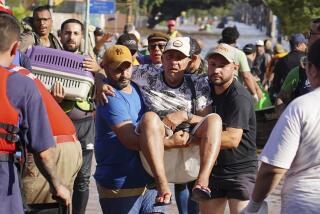State of emergency declared in northern Brazilian state as police strike leads to violent crime spike
- Share via
Reporting from SÃO PAULO — A state of emergency was declared Saturday in the Brazilian state of Rio Grande do Norte as its police approached the third week of a strike that has led to a spike in violent crimes.
Civil and military police walked off the job Dec. 19 to demand back pay and better working conditions.
Officers haven’t been paid in full since November. They were told the rest of their salaries from two months ago would be issued this week, but the payday was again pushed back, this time to Monday. December paychecks and mandatory end-of-year bonuses have yet to be discussed.
Last month, Rio Grande do Norte’s state government asked the federal government for an extra 600 million reais ($185.8 million) to pay its public servants the salaries they were owed. The Ministry of Finance denied the request.
Talks between the police and the state government have stalled, despite the strike being declared illegal and the threat that officers who promote the walkout will be arrested. The next round of talks is expected on Wednesday.
A handful of military police officers have returned to work since they were threatened with arrest, and the civil police have been operating with a reduced number of officers, but the state remains on edge. Even when the full military force is patrolling the streets, there is a shortage of at least 5,000 officers. The state hasn’t opened the selection process for new recruits since 2005.
Armed forces were sent to Rio Grande do Norte on Dec. 29, but the 2,800 federal troops haven’t been able to keep up. While security on the streets has improved since the first days of the strike, only 50% of 911 calls are being answered.
More than 100 people have been killed since police stopped patrolling the streets of the northeastern state, considered one of the deadliest places in the world long before the strike. The number of homicides in Rio Grande do Norte has been on the rise for years, jumping 232% between 2005 and 2015. According to a report from the Observatory of Intentional Lethal Violence, 2,408 people were killed last year, a record number of homicides for the state.
Much of the violence on the streets of Rio Grande do Norte is because of a longstanding turf war between local gang Família do Norte and São Paulo-based gang Primeiro Comando da Capital, or PCC. The state is part of a much-desired drug-trafficking route that would be extremely profitable for the PCC, which has spread north in an attempt to overtake and control it.
The gang also has led several deadly prison riots in the last year in an attempt to assert itself across the country, officials said. At least 26 were killed last January at Alcaçuz prison in Rio Grande do Norte’s capital city of Natal after a two-day massacre attributed to the PCC. The most recent riot started by the gang was on the first day of the year at a prison in the state of Goiás. Nine inmates were killed.
The emergency decree, which was published in the state’s official gazette and is valid for 180 days, allows the government of Rio Grande do Norte to pay for emergency services and sign contracts without a bidding process.
Public security is not the only crisis the state is facing. It declared a state of emergency in public health and in its prison system last year, both of which are still in effect. A drought also has left 153 municipalities in Rio Grande do Norte in a state of emergency since early last year.
Langlois is a special correspondent.
More to Read
Sign up for Essential California
The most important California stories and recommendations in your inbox every morning.
You may occasionally receive promotional content from the Los Angeles Times.












